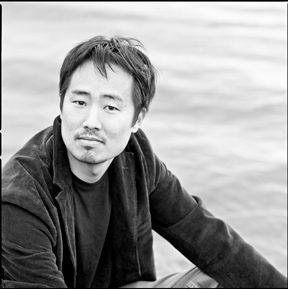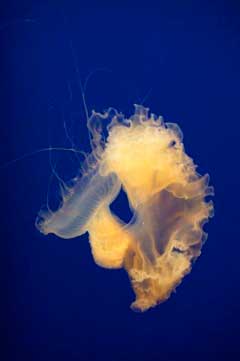USA, Literature, 2017
Jeffrey
Yang

A starfish is born! With these words, the American writer Eliot Weinberger praised Jeffrey Yang’s 2008 debut titled “An Aquarium: Poems.” Born in California in 1974, Yang completed his studies in biology and literature and now works as an editor for the prestigious publishing house New Directions. In his debut work, he is shown to be a poeta doctus, whose poetry is on the hand one committed to the visible, to facts and things, while at the same time a high degree of self-reflection.
In “An Aquarium: Poems,” Yang views the world from the vantage point of the sea: Overflowing with an encyclopedic knowledge, the volume is a collection of maritime poems presented in alphabetical order, ranging from dolphins to flounder, to lobsters and quahogs, and from seaweed to squid – while also touching along the way upon aspects of religion and philosophy, and of science and culture. Technical terms and jargon from many different areas can be found in this abecedarium of the aquatic life, which is subjected in this context to expansive, worldly and critical references: For example, the term for “Z” is “zooxanthellae,” which denotes a kind of algae that lives in a symbiotic relationship with coral, providing it with oxygen and nutrients that the reef relies on for survival. The poet alerts the reader to the precariousness of this symbiosis, especially in light of the 76 atomic tests performed by the United States, the “fish that consumes the whole sea” (in: An Aquarium). In this book, the aquarium becomes a metaphor for the world we live in, which is why we encounter creatures from different times and places, such as the Italian nationalist Garibaldi, the poet Kenneth Rexroth, and even Google. In this universe, everything is connected with everything else – and yet nothing is imitative in the least. Yang’s poetry offers a breath of fresh air with a palpable dynamism, while at the same time managing to preserve an intense musicality despite the abrupt cuts and montages. Whatever he describes is endowed with life. Thanks to his subtle humor, he teaches the reader without coming across as patronizing. The knowledge from which he mines his work is unfurled like a scroll, neatly packaged in unadorned language. Without wasting a single word, he covers complex relationships with pithy concision. His work evinces a harmonious balance between postmodernity and ancient knowledge, while his poems can be considered a site for complex connections. Yang stayed the poetological course in his second volume, titled “Yennecott” (2015). Here he plumps the depths of time and goes back centuries, using the form of a long poem in the American tradition pioneered by Walt Whitman in “Leaves of Grass” as well as the poetic explorations of nature by Gary Snyder. Yennecott is the name that the Native American inhabitants gave to what is now known as Long Island, before they were forced to leave when it was colonized by settlers. Yang portrays the settlement history from the perspective of the Native Americans as an alternative to the official version of history by depicting the settlements as a process of appropriation driven by slavery, exploitation and destructive urges. That’s why the view of the lyrical narrator cuts “across the centuries” (in: Yennecott), ranging from an historiographical note dating from the year 1069 to the narrator’s arrival on Long Island. In this context, the lyrical narrator functions almost like a medium for note-taking, using bold cuts to interleave numerous excerpts from historical sources ranging from travelogues, diaries, juridical texts and myth from Native American and European traditions, to quotations from other authors such as Melville, Dickinson, and Mayakovsky. The elegant ordering of the montage – in which connections are intentionally left visible – grants the poet license to offer a critique without explicitly naming it as such: For example, whereas the earliest colonists praised Native Americans for their hospitality and friendship, later accounts report that these same colonists brutally massacred the inhabitants; the conclusion one can draw about these conflicting reports requires no additional commentary. By inserting quotations from famous texts, Yang creates an additional effect because the passages weave a web that transcends space and time. In this regard, “Yennecott” can be read as a universal parable that illuminates processes of repression and submission, even as we know them today, for example, when Yang mentions the word “Guantanamo.” He eschews footnotes and all other notes, following in the footsteps of his beloved role model Octavio Paz, who locates the revelation of human freedom in a poem’s autonomy. Thanks to this technique, Yang’s words conjure their subjects instead of merely recalling them, thus rendering the past visible and palpable in the present. Moreover, Yang uses poetic memory to offer up a challenge to that which was extinguished in the official version of history. One of the poet’s main interests centers on the intersection of geography and history. He wrests a lyrical note from the eternal return of historical conquest by using poetry to ask which path knowledge can take, and where it can venture. And how our way of reading history can change as a consequence of cultural exchange. In his more recent works, he researches connections between desert music created in the American Southwest and the Taklamakan desert in Central Asia, and connections between an ancient Buddhist kingdom in Malaysia and Buddhist culture along the Silk Road, as artifacts from the latter evince traces of Greek influence only made possible by the campaigns of Alexander the Great. As readers, we can look forward to new work from the poetus docta Jeffrey Yang.
Text: Claudia Kramatschek
Ein Aquarium. Gedichte. Englisch/Deutsch. Translated by Béatrice Faßbender. Berenberg Verlag, Berlin 2012.
Yennecott. Gedicht. Englisch/Deutsch. Translated by Béatrice Faßbender. Berenberg Verlag, Berlin 2015.



